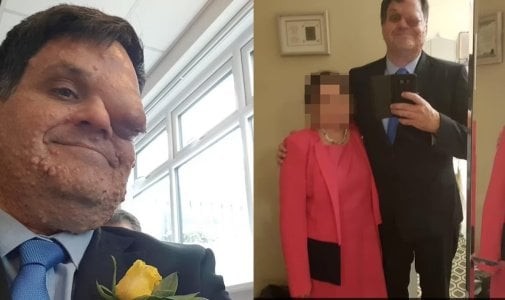Shocking! This restaurant kicked someone out for their looks – Could it happen to you?
By
Seia Ibanez
- Replies 13
In an age where inclusivity and diversity are celebrated more openly than ever before, it's shocking to hear that discrimination based on appearance still occurs, and even more so when it happens in places designed for public enjoyment and hospitality. Yet, this is precisely what Oliver Bromley, a man with Neurofibromatosis Type 1, experienced in a restaurant in Camberwell, South London.
Neurofibromatosis Type 1 is a genetic condition that causes non-cancerous tumours to grow along a person's nerves. It's a condition that can lead to visible physical changes and, in Oliver's case, a facial disfigurement. Despite the challenges he faces, Oliver, like many with visible differences, seeks to live a normal life, which includes enjoying a meal out.

However, during what should have been a simple outing for a bite to eat, Oliver was confronted with a stark reminder that ignorance and prejudice still lurk in our society. After initially visiting the restaurant and leaving to withdraw cash, he returned only to be told by the staff to 'please leave' because he was 'scaring the customers.' This claim of customer complaints seems dubious at best, as Oliver noted the short time frame between his visits would hardly allow for such feedback.
The incident, which Oliver took 'very personally', left him understandably upset. Yet, he chose not to confront the staff and left the establishment. His response was not to retaliate but to seek a resolution and educate, as he later reported the incident to the Metropolitan Police and complained to the restaurant.
Oliver's experience is a stark reminder that discrimination can happen to anyone, anywhere, and at any time. It's a call to action for all of us to reflect on our own biases and the way we treat others who may look different from ourselves. It's also a reminder that businesses and their staff have a responsibility to uphold the values of equality and non-discrimination.
The response from Nerve Tumours UK, a charity that supports individuals with Neurofibromatosis, was one of disappointment but also of determination. Karen Cockburn, the charity director, expressed the organization's commitment to raising awareness and educating the public about the condition. Their outreach to the restaurant and UK Hospitality, the trade association body, is a positive step towards ensuring that what happened to Oliver doesn't happen to others.
The Met Police's involvement underscores the seriousness of the incident. While no arrests were made, the police's acknowledgment of the report as a hate crime is significant. It's a reminder that such acts of discrimination are not only morally reprehensible but can also have legal consequences.
For our readers at the Seniors Discount Club, this story may hit close to home. Many of us, or our loved ones, live with visible differences or disabilities. It's essential to know that there are laws and protections in place to prevent discrimination and that there are steps you can take if you find yourself in a similar situation.
If you ever face discrimination, remember to:
1. Stay calm and collected, as Oliver did.
2. Report the incident to the establishment's management and, if necessary, to the authorities.
3. Seek support from organizations that advocate for individuals with disabilities or visible differences.
4. Share your story to raise awareness and help prevent future incidents.

Let's use Oliver's unfortunate experience as a catalyst for change and continue to work towards a society where everyone, regardless of appearance, is treated with dignity and respect. Have you or someone you know faced similar discrimination? How was it handled? Share your experiences and thoughts in the comments below. Together, we can support each other and advocate for a more inclusive world.
Neurofibromatosis Type 1 is a genetic condition that causes non-cancerous tumours to grow along a person's nerves. It's a condition that can lead to visible physical changes and, in Oliver's case, a facial disfigurement. Despite the challenges he faces, Oliver, like many with visible differences, seeks to live a normal life, which includes enjoying a meal out.

Oliver Bromley, who has Neurofibromatosis Type 1, was asked to leave the restaurant. Credit: Facebook
However, during what should have been a simple outing for a bite to eat, Oliver was confronted with a stark reminder that ignorance and prejudice still lurk in our society. After initially visiting the restaurant and leaving to withdraw cash, he returned only to be told by the staff to 'please leave' because he was 'scaring the customers.' This claim of customer complaints seems dubious at best, as Oliver noted the short time frame between his visits would hardly allow for such feedback.
The incident, which Oliver took 'very personally', left him understandably upset. Yet, he chose not to confront the staff and left the establishment. His response was not to retaliate but to seek a resolution and educate, as he later reported the incident to the Metropolitan Police and complained to the restaurant.
Oliver's experience is a stark reminder that discrimination can happen to anyone, anywhere, and at any time. It's a call to action for all of us to reflect on our own biases and the way we treat others who may look different from ourselves. It's also a reminder that businesses and their staff have a responsibility to uphold the values of equality and non-discrimination.
The response from Nerve Tumours UK, a charity that supports individuals with Neurofibromatosis, was one of disappointment but also of determination. Karen Cockburn, the charity director, expressed the organization's commitment to raising awareness and educating the public about the condition. Their outreach to the restaurant and UK Hospitality, the trade association body, is a positive step towards ensuring that what happened to Oliver doesn't happen to others.
The Met Police's involvement underscores the seriousness of the incident. While no arrests were made, the police's acknowledgment of the report as a hate crime is significant. It's a reminder that such acts of discrimination are not only morally reprehensible but can also have legal consequences.
For our readers at the Seniors Discount Club, this story may hit close to home. Many of us, or our loved ones, live with visible differences or disabilities. It's essential to know that there are laws and protections in place to prevent discrimination and that there are steps you can take if you find yourself in a similar situation.
If you ever face discrimination, remember to:
1. Stay calm and collected, as Oliver did.
2. Report the incident to the establishment's management and, if necessary, to the authorities.
3. Seek support from organizations that advocate for individuals with disabilities or visible differences.
4. Share your story to raise awareness and help prevent future incidents.
Key Takeaways
- Oliver Bromley, a man with Neurofibromatosis Type 1 which causes non-cancerous tumours to grow on nerves, was ejected from a restaurant due to customer complaints about his appearance.
- The incident occurred in August at a restaurant in Camberwell, south London, which Oliver Bromley chose not to name.
- Mr Bromley believes the action taken by the restaurant staff was due to a lack of education about his condition, and not actual customer complaints.
- The incident led to Mr Bromley reporting the situation to the Metropolitan Police and his intent to raise awareness for people with facial deformities, with support from the charity Nerve Tumours UK.
Let's use Oliver's unfortunate experience as a catalyst for change and continue to work towards a society where everyone, regardless of appearance, is treated with dignity and respect. Have you or someone you know faced similar discrimination? How was it handled? Share your experiences and thoughts in the comments below. Together, we can support each other and advocate for a more inclusive world.







